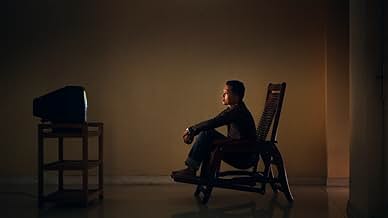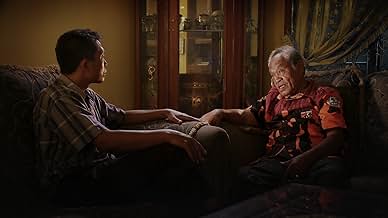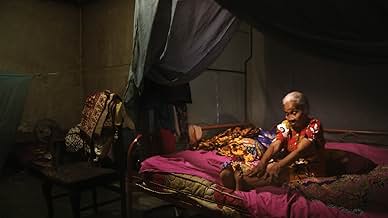The Look of Silence
- 2014
- Tous publics
- 1h 43m
A family that survived the genocide in Indonesia confronts the men who killed one of their brothers.A family that survived the genocide in Indonesia confronts the men who killed one of their brothers.A family that survived the genocide in Indonesia confronts the men who killed one of their brothers.
- Nominated for 1 Oscar
- 48 wins & 45 nominations total
- Self - former leader of death squad
- (archive footage)
- Self
- (voice)
- (as Josh)
- Self - Sprecher
- (voice)
- (as Achim Schülke)
- Self - reporter, NBC News
- (archive footage)
Featured reviews
After my viewing of it finished at 7 a.m., I was lowering myself into a warm bathtub when suddenly I became haunted by the feeling that headless bodies were floating past me as if I were in the Snake River where the corpses had been dumped. Indeed, I couldn't put the film out of my head the rest of the day, and haven't since. The film follows an Indonesian man named Adi Runkun whose brother had been brutally murdered in the 1965 purge of 'communists' as he confronts, in the present day and under the pretext of dispensing eye exams, the men who had carried out the killings (and who had boasted and joked about the carnage in "The Act of Killing"). We also see Adi's humane care-taking of his nearly dead father whom he bathes and consoles, and other family members who have had to live among his brother's murderers for decades. What makes this film so effective is how Adi refuses to display any emotion at the killers while the director continues to portray them as human beings rather than monsters (no revenge film this), but Adi's silent stare keeps burning into their souls as they squirm uncomfortably, stubbornly offering lame excuses while refusing any expressions of regret. By this method Oppenheimer makes the film much more of an iconic document of man's inhumanity to man, forcing viewers to contemplate parallels in history, most especially the Nazis who perpetrated the Holocaust in Hitler's Germany.
There is nothing easy about this film, yet it is one of the few films you must not miss if you have a heart that pumps blood.
I have never been able to write anything about its prequel, "The Act of Killing". I broke my rule of reviewing every movie I watch on here because I just wasn't up to the task. Watching that movie, and "The Look of Silence" to a slightly lesser extent, was like being dosed with heroin and hit with a sledgehammer. The usual "disturbing" movie, documentary or otherwise, has an impact that can be shaken off eventually. With "The Act of Killing", I never really felt it, but I knew it was there. It took something from me. The impact bled through into my day to day life. It wasn't just like a bad dream. It was real.
Here is "The Look of Silence". It gives a different side of the story that "Act of Killing" presented, through the son of survivors of the Indonesian genocide. He learns about the fate of his older brother, killed two years before his birth. Then he confronts some of the killers and their families, though these meetings don't go as you might expect, especially for the son, Adi.
This movie really should be watched alongside "The Act of Killing". Whereas "The Look of Silence" is no less horrible in its descriptions of actual murder, I have a feeling that it is the goodness of Adi and his family you will remember.
Oppenheimer utilised this blood-curdling footage years later, by showing its profound horror to a middle-aged Indonesian man whose brother was an unfortunate victim of the national purge. Acknowledging the explicit nature of his country's past and yearning to learn more, he singlehandedly confronts the perpetrators who executed the killings with Oppenheimer documenting the anxiety-inducing conversations, under the pretence of an eye examination. Through the changing of lenses, this metaphorical dissimulation magnifies the retinas of "Adi's" brother's executors, allowing windows into their darkened souls to widen.
Predictably, much like with Oppenheimer's creatively profound companion piece 'The Act of Killing', these individuals expressed minimal remorse. Proud to serve their nation and glorify their political ideologies. However, the purpose of these bleak confrontations was not to agitate those that committed such atrocities, but to perpetuate a historic generational divide within Indonesia. The current generation educated with false truths to adhere to the current sociopolitical climate. "Communists gouged the eyes out of army generals", students are taught. Yet the truth couldn't be any further from that manipulative fabrication. Everyone seemingly forced into silence regarding the questioning of their own national history. Therefore, producing such an unflinching documentary that dares to question the morality and legitimacy behind one of the worst genocides in recent history, is of paramount importance. Not just to Indonesia, but every nation that endures tainted democracy. Inciting societies to educate themselves and not ignore the grave actions of their previous generation.
Oppenheimer challenges the boundaries of documentary filmmaking once again, crafting uncompromising perceptive enlightenment through one man. A man whom represented the nullified silence of those feared by their own government. A man whom fearlessly questioned the very individuals that shaped his current standard of living. Representing the suffering and fragility of an oppressed society. Understatedly profound, yet consistently unshakeable in nature. The inclusion of iridescent quietude, from expansive shots of village life to close-ups of metamorphosis, overemphasising the extinguished freedom of speech. Many of the confrontations delivering unwavering tyrannical sensibilities likening their ideologies to totalitarian repression, exhibiting minimal sorrow for the thousands they slaughtered. Conversations that rightly bury the words under the skin to those listening. Ranging from indirect threats such as "be careful, what you're doing may be deemed as communist behaviour" to Western influences including "America taught us how to hate communists". Undoubtedly disconcerting.
Reservations for the confrontation with "Adi's" uncle, whom was guarding "communists" before they were massacred, is the sole criticism this documentary obtains. Staged, exploitative and unnecessarily producing familial drama in a nation that is already fragmented and traumatised. Consequently Oppenheimer overstepped the line in that particular instance, despite "Adi's" insistence, creating an artificially uncomfortable atmosphere for the sake of drama.
However, whilst not creatively innovative as his former insight into the Indonesian Genocide, Oppenheimer's The Look of Silence unequivocally nullifies all emotive output, perhaps more so that his previous directorial efforts. It is unflinching. It is uncompromising. It is of paramount significance. We need boundary-testing documentaries like this to truly provide insight and to evoke human right activism. To microscopically magnify the actions of humanity's past and ensure they never happen again. "That's politics. Politics is the process of achieving your ideals", the former commander of civilian militia joyously states with a grimace. "In many ways...".
Did you know
- TriviaAdi and his family moved thousands of kilometers away to the other side of the country, out from under the shadow of the perpetrators who are still powerful situation in North Sumatra.
- Quotes
Himself, brother of murdered Ramli Rukun: Tell me about that madness.
Himself, former leader the village death squad: Some killed so many people who have gone mad. A man climbed a palm tree, every morning, to call for prayer. Killed too many people. There is only one way to avoid it. Drink the blood or go crazy. But if you drink blood, you can do anything.
Himself, brother of murdered Ramli Rukun: [Testing the eyeglasses] What do you think...
Himself, former leader the village death squad: Salty and sweet. The human blood.
Himself, brother of murdered Ramli Rukun: Pardon?
Himself, former leader the village death squad: Human blood is salty and sweet. I know from experience.
- ConnectionsEdited into P.O.V.: The Look of Silence (2016)
- SoundtracksLukisan Malam
music by E. Sambayon & lyrics by Sakti Alamsyah
performed by Sam Saimun
courtesy of Irama Records
- How long is The Look of Silence?Powered by Alexa
Details
- Release date
- Countries of origin
- Official sites
- Language
- Also known as
- Sessizliğin Bakışı
- Filming locations
- Production companies
- See more company credits at IMDbPro
Box office
- Gross US & Canada
- $109,089
- Opening weekend US & Canada
- $6,616
- Jul 19, 2015
- Gross worldwide
- $157,857
- Runtime1 hour 43 minutes
- Color
Contribute to this page




























